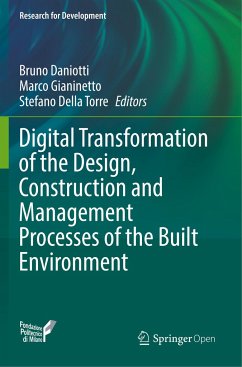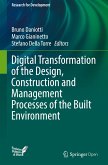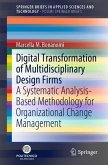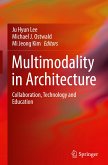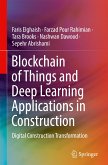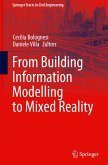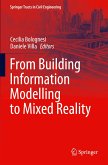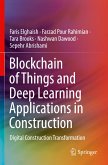Digital Transformation of the Design, Construction and Management Processes of the Built Environment
Herausgegeben:Daniotti, Bruno; Gianinetto, Marco; Della Torre, Stefano
Digital Transformation of the Design, Construction and Management Processes of the Built Environment
Herausgegeben:Daniotti, Bruno; Gianinetto, Marco; Della Torre, Stefano
- Broschiertes Buch
- Merkliste
- Auf die Merkliste
- Bewerten Bewerten
- Teilen
- Produkt teilen
- Produkterinnerung
- Produkterinnerung
This open access book focuses on the development of methods, interoperable and integrated ICT tools, and survey techniques for optimal management of the building process. The construction sector is facing an increasing demand for major innovations in terms of digital dematerialization and technologies such as the Internet of Things, big data, advanced manufacturing, robotics, 3D printing, blockchain technologies and artificial intelligence. The demand for simplification and transparency in information management and for the rationalization and optimization of very fragmented and splintered…mehr
Andere Kunden interessierten sich auch für
![Digital Transformation of the Design, Construction and Management Processes of the Built Environment Digital Transformation of the Design, Construction and Management Processes of the Built Environment]() Digital Transformation of the Design, Construction and Management Processes of the Built Environment37,99 €
Digital Transformation of the Design, Construction and Management Processes of the Built Environment37,99 €![Digital Transformation of Multidisciplinary Design Firms Digital Transformation of Multidisciplinary Design Firms]() Marcella M. BonanomiDigital Transformation of Multidisciplinary Design Firms44,99 €
Marcella M. BonanomiDigital Transformation of Multidisciplinary Design Firms44,99 €![Multimodality in Architecture Multimodality in Architecture]() Multimodality in Architecture125,99 €
Multimodality in Architecture125,99 €![Blockchain of Things and Deep Learning Applications in Construction Blockchain of Things and Deep Learning Applications in Construction]() Faris ElghaishBlockchain of Things and Deep Learning Applications in Construction125,99 €
Faris ElghaishBlockchain of Things and Deep Learning Applications in Construction125,99 €![From Building Information Modelling to Mixed Reality From Building Information Modelling to Mixed Reality]() From Building Information Modelling to Mixed Reality161,99 €
From Building Information Modelling to Mixed Reality161,99 €![From Building Information Modelling to Mixed Reality From Building Information Modelling to Mixed Reality]() From Building Information Modelling to Mixed Reality161,99 €
From Building Information Modelling to Mixed Reality161,99 €![Blockchain of Things and Deep Learning Applications in Construction Blockchain of Things and Deep Learning Applications in Construction]() Faris ElghaishBlockchain of Things and Deep Learning Applications in Construction125,99 €
Faris ElghaishBlockchain of Things and Deep Learning Applications in Construction125,99 €-
-
-
This open access book focuses on the development of methods, interoperable and integrated ICT tools, and survey techniques for optimal management of the building process. The construction sector is facing an increasing demand for major innovations in terms of digital dematerialization and technologies such as the Internet of Things, big data, advanced manufacturing, robotics, 3D printing, blockchain technologies and artificial intelligence. The demand for simplification and transparency in information management and for the rationalization and optimization of very fragmented and splintered processes is a key driver for digitization. The book describes the contribution of the ABC Department of the Polytechnic University of Milan (Politecnico di Milano) to R&D activities regarding methods and ICT tools for the interoperable management of the different phases of the building process, including design, construction, and management. Informative case studies complement the theoreticaldiscussion. The book will be of interest to all stakeholders in the building process - owners, designers, constructors, and faculty managers - as well as the research sector.
Produktdetails
- Produktdetails
- Research for Development
- Verlag: Politecnico di Milano / Springer / Springer International Publishing / Springer, Berlin
- Artikelnr. des Verlages: 978-3-030-33572-4
- 1st edition 2020
- Seitenzahl: 416
- Erscheinungstermin: 18. September 2020
- Englisch
- Abmessung: 235mm x 155mm x 21mm
- Gewicht: 715g
- ISBN-13: 9783030335724
- ISBN-10: 3030335720
- Artikelnr.: 60148925
- Herstellerkennzeichnung
- Books on Demand GmbH
- In de Tarpen 42
- 22848 Norderstedt
- info@bod.de
- 040 53433511
- Research for Development
- Verlag: Politecnico di Milano / Springer / Springer International Publishing / Springer, Berlin
- Artikelnr. des Verlages: 978-3-030-33572-4
- 1st edition 2020
- Seitenzahl: 416
- Erscheinungstermin: 18. September 2020
- Englisch
- Abmessung: 235mm x 155mm x 21mm
- Gewicht: 715g
- ISBN-13: 9783030335724
- ISBN-10: 3030335720
- Artikelnr.: 60148925
- Herstellerkennzeichnung
- Books on Demand GmbH
- In de Tarpen 42
- 22848 Norderstedt
- info@bod.de
- 040 53433511
Stefano Della Torre, who graduated in Civil Engineering and in Architecture, is a Full Professor of Restoration at the Politecnico di Milano in Milan, Italy, and Director of the ABC Department (Architecture, Built Environment and Construction Engineering). He is the author of more than 360 publications. He served as an advisor to the CARIPLO Foundation (Cultural Districts), the Italian Government and Lombardy Region (policies on planned conservation of historical-architectural heritage). He has been President of BuildingSMART Italia - the national chapter of BuildingSMART International (2011-2017). Bruno Daniotti is Full Professor of Building Production in the ABC Department at Politecnico di Milano. He holds a PhD in Building Engineering and has more than 30 years of experience in various fields of research in construction at the national and international levels, having worked in universities and research centres such as ICITE-CNR and EC JRC (Ispra). He has also collaborated with research organizations and public and regulatory bodies, including ISO, EOTA, and UNI. He was the Italian Coordinator of the STANDINN project, PM of the INNOVance Project, and representative of Politecnico di Milano in BuildingSmart Italia from 2005 to 2015. He is also the coordinator of various other projects, including the BIMReL project and the BIM4EEB EU research project "BIM based fast toolkit for Efficient rEnovation in Buildings". Marco Gianinetto holds an MS in Environmental and Land Management Engineering and a PhD in Geodesy and Geomatics and is currently Associate Professor of Geomatics at Politecnico di Milano. His research interests lie in the fields of remote sensing, earth observation, and spatial information technologies for environmental monitoring. He is a member of the Governing Council of the Italian Remote Sensing Society, Co-Editor-in-Chief for the European Journal of Remote Sensing (UK), Associate Editor for the International Journal of Remote Sensing (UK), and Associate Editor for the Journal of Applied Remote Sensing (USA). Marco Gianinetto has been a member of international advisory/evaluator panels, including the Executive Agency for SMEs of the European Commission, the Israel Science Foundation, the National Research Council of Romania, the Belgian Federal Science Policy Office, and the French National Research Agency.
PART I: INTEROPERABLE MANAGEMENT OF THE PROCESS, National BIM digital platform for construction (INNOVance project).- From cloud to BIM model of the built environment: the digitized process for competitive tender, project, construction and management.- The construction contract execution through the integration of Blockchain technology.- The BIMReL Project, the BIM interoperable library in the Lombardy Region.- Life cycle BIM-oriented data collection: a framework for supporting practitioners.- Decision-making BIM platform for chemical building products.- BIM electrical objects plug-in for industry 4.0.- Da.Ma.Tra: Material Traceability Database.- Natural language processing for information and project management.- Structure of a general Exchange Information Requirements (EIR) for tenders according to the UNI 11337:2017 standard.- PART II: DESIGN STAGE, Clash detection and code checking BIM platform for the Italian market.- Digital tool for optimization.- Performance-based designapproach for tailored acoustic surfaces.- Do Smart City policies work?.- Digital design and wooden architectures for Arte Sella Land Art Park.- The impact of digitalization on processes and organizational structures of architecture and engineering firms.- PART III: EXECUTION STAGE, BIM management guidelines of the construction process for general contractors.- BIM methodology and tools implementation for the construction companies.- Adaptive skins: towards new material systems.- Development of a system for the production of disposable carbon fiber formworks.- PART IV: MANAGEMENT STAGE, Built Heritage Information Modelling/Management. Research Perspectives.- Digital asset management.- Building and district data organization to improve facility and property management.- Digital transformation in Facility Management (FM). IoT and Big Data for service innovation.- BIM digital platform for first aid: firefighters, police, red cross.- The effect of real-time sensing of a window on energy efficiency, comfort, health and user behavior.- Digital 3D control room for Healtcare.- Guidelines to integrate BIM for asset and facility management of a public university.- BIM and Post-occupancy evaluations for building management system: weaknesses and opportunities.- PART V: DIGITAL TECHNOLOGIES FOR MULTI-SCALE SURVEY AND ANALYSIS, From a traditional to a digital site: 2008-2019 the history of Milan Cathedral surveys.- The 3D model of St. Mark's Basilica in Venice.- Automatic processing of many images for 2D/3D modelling.- Geo-referenced procedure to estimate the urban energy demand profiles towards Smart Energy District scenarios.- Advanced digital technologies for the conservation and valorisation of the UNESCO Sacri Monti.- Survey and scan - to BIM model for the knowledge of built heritage and themanagement of conservation activities.
PART I: INTEROPERABLE MANAGEMENT OF THE PROCESS, National BIM digital platform for construction (INNOVance project).- From cloud to BIM model of the built environment: the digitized process for competitive tender, project, construction and management.- The construction contract execution through the integration of Blockchain technology.- The BIMReL Project, the BIM interoperable library in the Lombardy Region.- Life cycle BIM-oriented data collection: a framework for supporting practitioners.- Decision-making BIM platform for chemical building products.- BIM electrical objects plug-in for industry 4.0.- Da.Ma.Tra: Material Traceability Database.- Natural language processing for information and project management.- Structure of a general Exchange Information Requirements (EIR) for tenders according to the UNI 11337:2017 standard.- PART II: DESIGN STAGE, Clash detection and code checking BIM platform for the Italian market.- Digital tool for optimization.- Performance-based designapproach for tailored acoustic surfaces.- Do Smart City policies work?.- Digital design and wooden architectures for Arte Sella Land Art Park.- The impact of digitalization on processes and organizational structures of architecture and engineering firms.- PART III: EXECUTION STAGE, BIM management guidelines of the construction process for general contractors.- BIM methodology and tools implementation for the construction companies.- Adaptive skins: towards new material systems.- Development of a system for the production of disposable carbon fiber formworks.- PART IV: MANAGEMENT STAGE, Built Heritage Information Modelling/Management. Research Perspectives.- Digital asset management.- Building and district data organization to improve facility and property management.- Digital transformation in Facility Management (FM). IoT and Big Data for service innovation.- BIM digital platform for first aid: firefighters, police, red cross.- The effect of real-time sensing of a window on energy efficiency, comfort, health and user behavior.- Digital 3D control room for Healtcare.- Guidelines to integrate BIM for asset and facility management of a public university.- BIM and Post-occupancy evaluations for building management system: weaknesses and opportunities.- PART V: DIGITAL TECHNOLOGIES FOR MULTI-SCALE SURVEY AND ANALYSIS, From a traditional to a digital site: 2008-2019 the history of Milan Cathedral surveys.- The 3D model of St. Mark's Basilica in Venice.- Automatic processing of many images for 2D/3D modelling.- Geo-referenced procedure to estimate the urban energy demand profiles towards Smart Energy District scenarios.- Advanced digital technologies for the conservation and valorisation of the UNESCO Sacri Monti.- Survey and scan - to BIM model for the knowledge of built heritage and themanagement of conservation activities.

